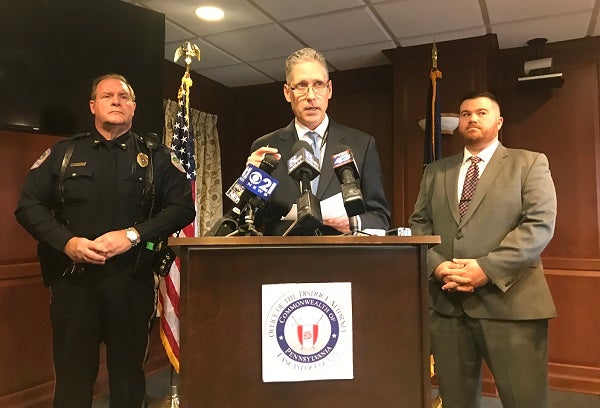Lancaster County tops list for charging heroin dealers with homicide
Lancaster County pursues drug-induced homicide charges more than any other county in the United States, according to a recent report from data gathering project Mission LISA.

Lancaster County District Attorney Craig Stedman, center, speaks to reporters Dec. 6, 2018 about the October 26 multi-vehicle crash that killed two Warwick High School students. At left is Lititz Borough Police Chief Kerry Nye. At right, Lancaster County Assistant District Attorney Jared Hinsey. (Brett Sholtis/WITF News)
Lancaster County pursues drug-induced homicide charges more than any other county in the United States, according to a recent report from data gathering project Mission LISA. Three other Pennsylvania counties ranked in the top five in the nation, and overall, prosecutors in Pennsylvania filed the charge more than in any other state.
Drug-induced homicide, also known as drug delivery resulting in death, is a felony charge prosecutors use to target drug dealers who sell fatal doses of heroin, said Lancaster County District Attorney Craig Stedman.
The law has been on the books for decades, he said. However, with the rise of opioid addiction, and with the streets flooded with deadly mixes of heroin and fentanyl, more district attorneys are using the charge. In Lancaster, it was used 66 times in 2018.
He said pursuing drug sellers can help to keep “bad batches” of heroin off the streets, and can bring justice for families who have lost someone to an overdose.
“I don’t think this is a magic bullet that’s going to end the opioid crisis, but is it part of the solution? I’m absolutely convinced it is, and there’s just something about being held accountable.”
Stedman noted that prosecutors don’t use the charge for people he characterizes as casual drug sellers who are providing heroin to friends. Rather, they pursue people who are selling heroin as a business operation.
In Lancaster County, drug dealers are getting the message, Stedman said.
“One guy, in particular, they arrest him, he’s a long-time heroin dealer, and he was arrested for cocaine,” Stedman said. “They said, ‘what are you doing? You’re a long-time heroin dealer.’ And he said, ‘look, message received. I’m not catching a body in Lancaster County.'”
The move remains controversial, with groups such as Drug Policy Alliance saying locking up drug dealers is costly and ineffective at reducing opioid addiction.
In a 2018 interview, Drug Policy Alliance attorney Lindsay LaSalle said there’s a disconnect between society’s sympathy for users and the way they look at drug sellers. It’s good that society has begun to understand that opioid addiction can happen to anyone, but those who sell drugs are often still seen through stereotypes.
“And I think that it plays out along racialized lines,” LaSalle said. “And now we see this kind of flip, where you have the compassion for the person who used but you want to throw the hammer at the person who sold. And this is an absolutely false dichotomy. The distinction between user and seller is often patently false.”
Here are the top five counties listed in the Dec.18, 2018 nationwide county-by-county analysis:
- Lancaster County, Pennsylvania — 58 charges of drug-induced homicide filed*
- Bucks County, Pennsylvania — 37 charges filed
- York County, Pennsylvania — 35 charges filed
- Westmoreland County, Pennsylvania — 33 charges filed
- McHenry County, Illinois — 29 charges filed
Mission LISA bills itself as “a data aggregation project that aims to use publicly-available data to find trends in the opioid epidemic that might help policymakers and those working to fight the crisis,” according to spokeswoman Jill Kermes. The project is tied to Lumina Analytics, a Tampa, Florida-based company that seeks to use data to target risks. The data was sourced from news reports and state, county and local criminal filings.
WHYY is your source for fact-based, in-depth journalism and information. As a nonprofit organization, we rely on financial support from readers like you. Please give today.






